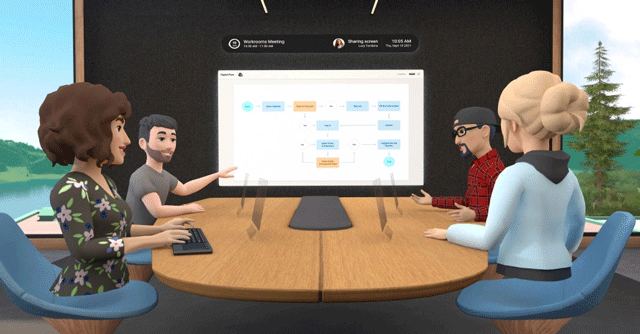
HR warms up to the metaverse to conduct interviews, enhance employee engagement


In 2020, shortly before the pandemic began, global consultancy firm Accenture had built an immersive employee engagement platform called the Nth floor. The platform, which was built using Microsoft’s MR platform called Mesh, allowed Accenture’s employees to meet for presentations, socialize with each other and even conduct training sessions, all without actually meeting in person.
Microsoft explained in a November 2021 blog post that the onboarding process typically "involves gathering new-hire cohorts and senior leadership in an office to go through a series of experiences that help people understand and personally connect with the Accenture culture, plant the seeds of professional relationships and set them up for success starting from their first projects”.
Accenture's immersive platform was a precusor to how human resource (HR) professionals would hire and engage with new and existing employees. Further, prompted by the pandemic-induced lockdowns, companies are not only doing ‘Zoom call’ interviews but simultaneoulsy experimenting with employee engagement in the so-called metaverse by incorporating technologies like virtual reality (VR), augmented reality (AR) and mixed reality (MR).

VR creates three dimensional spaces that users can view and interact with using head-mounted headsets. AR, on the other hand, puts virtual elements like holograms in the real world. Mixed reality, or MR, is an amalgamation of AR and VR that not only helps companies create digital simulations of the real world but also enhance these experiences.
That said, Accenture is not the only company to experiment with these technologies. PwC also designed something called PwC Virtual Parks in May last year, which allows users to create avatars, walk around the virtual space and take part in events. They can also meet virtually and network with others. Facebook’s Mark Zuckerberg had also showcased Horizon Workrooms last year, with which the company aims to bring the entire office experience into the virtual world.
While PwC and Accenture are trying VR and MR for employee engagement and hiring at the global level, Indian firms are jumping on the metaverse bandwagon.

Mumbai-based skilling and hiring platform Incluzon, for instance, is looking to digitise the interview process through metaverse implementations. The company is building a platform that it claims will allow HR professionals to gauge the interviewee’s body language and confidence levels. “India is currently in the nascent stages of adopting the metaverse, especially in HR practices. While the potential is enormous, companies considering the transition are investing in research and development (R&D) and the development of backend processes,” said Naveen Jangir, co-founder of Incluzon, an AI driven skilling and recruiting platform.
According to Jangir, current technology allows benchmarking and mapping specialized skill sets of any candidate to relevant jobs. “Current technology allows benchmarking or mapping the specialized skill sets of any candidate smoothly. However, while assessing a candidate's recent behaviour, the analytics are limited to psychometric tests, and extracting additional parameters using communication assessment. With the metaverse, we can have greater control to generate a virtual work environment and map how a candidate makes decisions or prioritizes their tasks under given scenarios. The behavioural parameters of candidates derived are far more reliable,” he added.
The big hurdle with deploying metaverse solutions, however, is the availability and cost of hardware required to provide meaningful immersive experiences. Incluzon said it is working to figure out the feasibility of making VR headsets available to students in smaller towns.

According to Neeti Sharma, senior vice president of digital staffing firm TeamLease Services, the industry may revisit an old concept to overcome this challenge. Around 2009, people used to travel to video conferencing centres in order to attend first round interviews, before they travelled to the job location for advance interview rounds. Sharma said she expects “metaverse parlours” to mushroom over the next few months in India, which will support the lack of infrastructure while startups and other firms work to bring VR and AR headsets to the mainstream.
